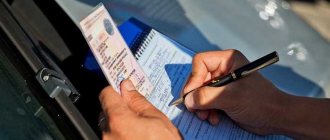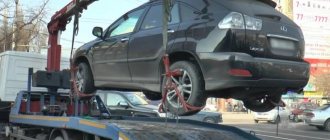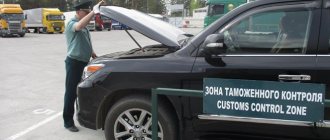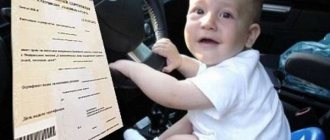Buying a car is a responsible and important step for any car owner. Especially if this is the first such purchase for a person and he has no experience as such. On portals that sell used cars, there are a huge number of cars, next to which there is a “prohibition of registration actions” mark.
In this case, everything is clear - the owner immediately warns the future owner about possible problems, often the cost of such cars is noticeably lower than the market. But what to do if there are no notes? In our article we will examine this issue in detail.
What is a ban on registration actions?
This wording refers to the restriction of the right to register a car with the traffic police. As a rule, such a measure is imposed by bailiffs for the debts of the car owner to the state: non-payment of taxes, alimony, loans, utilities, etc. Since the ban is imposed only on the alienation of the car, it is permitted to use it. That is, in theory, of course, you can buy such a car and drive it without going through the registration procedure. But, believe me, difficulties will not keep you waiting long. And there are many of them. We asked an expert, lawyer Sergei Radko, to comment on each case.
Difficulty 1. Problems with insurance payments
You can insure a car with a ban on registration actions, for example, through an agent. You don't have to own a car to do this. In this case, you will simply receive the status of “Insured” under the MTPL/CASCO policy. Another question is that your chances of getting money for repairs in the event of an accident are 50%. It all depends on who the insurance company’s security service considers to be the owner of the car: the one who has the purchase and sale agreement in hand, or the one for whom the registration documents are issued.
Lawyer's opinion
Sergei Radko, lawyer for the motorists movement “Freedom of Choice”
Sergei Radko, lawyer for the motorists movement “Freedom of Choice”
If an insured event occurs, you may be denied compensation. The damage is compensated to the owner, but formally he is the previous owner of the car - you didn’t register it with the traffic police. Representatives of the insurance company may ask you to show documents for the car, and they indicate the owner of another person. Therefore, he will be paid
Difficulty 2. The car may be taken away
And on legal grounds. Let's say you bought a car with a registration ban and did not register it with the traffic police. The ban was imposed due to the car owner's debts on a loan. He has nothing to pay him, the debt is accumulating. At some point, the creditor gets tired of this situation, and he turns to bailiffs to initiate the process of foreclosure on the debtor's property. In this case, the ban on alienation develops into a ban on disposal of the car. Moreover, it may not have been pledged to the bank. In short, the consequences are very serious.
How to check the ban on selling a car
First of all, it is necessary to study all the documents for the vehicle, and pay special attention to the title. If the car seller only has a duplicate technical passport in his hands, then it is best not to buy a car from him or to postpone this procedure for a certain time. In this situation, it is better to rewrite the VIN number of the car (in order not to get confused, you need to look for the red numbers in the PTS), with the help of which, by visiting the traffic police online, you can check the ban on the car. But on such a site there is no way to find out whether the car is mortgaged or on credit.
Just to avoid any problems after purchasing it, you need to do the following:
- When purchasing a vehicle, contact dealerships exclusively.
- When buying a vehicle secondhand, you must ask the seller to provide a receipt from the dealership where he purchased the car and, preferably, documents approving the transaction itself.
- When filling out a contract with the seller, it is best to write down the full price of the car, and try to ask the owner of the car to give a written guarantee that his vehicle is not in collateral and is not subject to a ban.
- Copy the title and with a copy go to the dealership where the car was purchased so that they can confirm the fact that it was purchased with personal funds or was purchased on credit.
- Check the car on the auto.ru website. There is a whole database of machines compiled by partner banks.
Lawyer's opinion
It is important to understand that the seller himself is not interested in lifting the ban - he has already received money for the car. Running to the bailiff and persuading him to lift the restriction is now your concern. And the bailiff will say: “Sorry, but within the framework of this enforcement proceedings you are not one of the parties. You are not a creditor, not a debtor. That’s why I won’t even talk to you.” And, in fact, he will be right.
- The car is pledged to the bank
Here the situation is even more clear. If a car is prohibited due to the fact that it is pledged to the bank, then according to the contract the owner does not have the right to alienate the car. In addition, in this case the bank also contains the car’s title. True, sometimes the owners of such cars manage to get a duplicate on the grounds that the original is supposedly lost.
What to do if the sale of a car is prohibited
The very fact of the ban has been established and quite logical questions arise: what to do in such a situation? First of all, the owner of the car must make every effort to eliminate the offenses that caused the ban, pay existing debts and fulfill all requirements emanating from the authorities that implemented the ban.
The actions of the car owner if the sale is prohibited are as follows:
- A trip to the traffic police, which will give him a copy of the ban decision. Here you should be prepared for the fact that you will receive not one resolution on the ban, but several at once, and from different authorities. It is in the documents issued that it will be indicated why the ban was imposed.
- Careful study of the decision on the ban. After this, the person decides whether he agrees with him or not. If yes, then the next steps are simple—the car owner fulfills all the prescribed requirements. If not, then he goes to court, where he can try to challenge the decision.
- Receiving a decision that the ban on selling the car has been lifted. After the owner of the car has fulfilled all the requirements that certain authorities put forward to him to eliminate the reasons for the ban, he goes to them again, but only to receive a resolution to lift the ban. But before visiting such authorities, you need to make sure that you have all the papers on hand that can confirm all the implementation of actions to eliminate offenses.
- A trip to the traffic police in order to provide all copies of the papers that indicate the lifting of the ban. In fact, the authorities that issued it must notify the traffic police about the lifting of the ban on the sale of the car. And they will certainly do this, but after how long it is unknown. Therefore, to speed up this process, it is better to go to the traffic police in person and show them all the documents. As soon as the employees of this government agency check all the documents provided, they will enter all the information into the general register and the problem is solved—the ban is lifted, and you can sell the car.
Lawyer's opinion
According to the law, such a transaction is not valid. That is, even if you draw up a purchase and sale agreement, ownership of the car will not transfer to you. In this situation, nothing can be done until the debt to the bank is repaid.
- The car is the subject of a property dispute
In this case, a ban on registration actions is imposed by the court - so that the car is not sold until a final decision on the ownership or division of property is made.
Is it possible to remove permanent registration and how?
Yes. And that's good news. But there are also bad ones - you can cancel eternal registration in 2021 only for two reasons:
- pay off debts for which a registration ban and permanent registration are imposed, as a result,
- if permanent accounting is imposed illegally.
The illegality of the ban can only be in one case - if the restriction and lifetime registration are imposed on the previous owner of the car by the bailiffs after the date of sale of the car. That is, at first the car was sold by the debtor, the information was not displayed in the database on time, and during the imposition of the ban, the bailiffs did not see that the owner of the vehicle had changed. And bailiffs, obviously, do not have the right to impose restrictions on someone else’s car.
If this happens, you only need to explain in a written statement to the bailiff who initiated the ban and the senior bailiff that the car has been alienated and show the purchase and sale agreement. The ban must be lifted. If not, then write a corresponding statement to the prosecutor's office.
If you have already bought a car with permanent registration, then there are no options to remove it except to pay off debts for the seller. But there is a risk here too - perhaps he has other debts for which enforcement proceedings have not yet been initiated. And in the period between the time you pay off your debts and the ban is lifted, new enforcement proceedings and new reasons for the ban may appear. And so on ad infinitum, if, for example, we are talking about debts for alimony or other regular payments that the debtor does not pay at all.
Limitation period for registration
There is another opportunity to remove the permanent registration of a car - if the debtor does not evade paying debts, but there is nothing to collect from him, enforcement proceedings will sooner or later be terminated due to the impossibility of collection. This happens most often 2-3 years after the initiation of the case and is only possible for debts under administrative fines.
This is possible in view of Article 43 of the Law “On Enforcement Proceedings”, paragraph 11 of which states that enforcement proceedings can be terminated if the possibility of collection is considered hopeless, according to the Budget Code. The Budget Code regulates a period of 2 years for recognizing a recovery as hopeless.
In line please...
Buying a car with a registration ban is always a lottery. If you are lucky, you can save a couple of hundred thousand rubles and drive such a car “on a bird’s license” for a year or two. Otherwise, you may be left without a car and without money. Moreover, trying to terminate the purchase and sale agreement is most often pointless. Well, they will oblige you by court to transfer the car to the previous owner, and he will be obliged to return the purchase price to you. You don’t think that a person who already has an impressive amount of debt behind him will rush to transfer money to you first? So welcome to the recovery club!
What to do if you bought a car with a restriction
Many owners, after seizing a car, try to sell it as soon as possible. And the buyer is found relatively quickly. Low cost attracts customers. If a person consciously takes such a step, then it should be understood that it is not possible to legally process the purchase. The seized cars are in the traffic police database.
Sometimes the buyer finds out about the arrest of his new car only at the traffic police, when the employee refuses to register. It turns out that there is a car, but you cannot use it fully legally.
There are several options for the development of events:
- Try to remove restrictions. This can be done if the bailiff seized the former owner’s car after the sale and purchase.
- Agree with the seller to cancel the deal and return the money. The result of such an action will be questionable, since the seller knew about the restrictions and deliberately concealed this information. Therefore, he will not agree to return the money again. Typically, such sellers change their phone numbers, hide and do not get in touch.
- Submit an application to terminate the transaction. If the car was purchased for less than 50,000 rubles, then you need to go to the magistrate’s court. If the amount is greater, the application is sent to the district authority.
Lawyer's opinion
In my opinion, a car with a registration ban is not at all interesting for purchase. Regardless of the reason for which the restriction was imposed. Unless you buy a car for a couple of thousand rubles to drive in a deep forest or in an open field, and then crash it safely. Otherwise, what to do next with such a machine? You cannot register it for yourself. Sell or donate - too. Driving it, knowing that today or tomorrow it will be put on the wanted list in order to sell it at auction to pay off a debt, is, in my opinion, a dubious pleasure.
Using the bailiffs website
You can find out about the ban on vehicle registration not only using the traffic police website, but also through the FSSP website. The procedure is divided into stages:
- on the institution’s website, enter the VIN number of the car or the number of the resolution found on the traffic police resource;
- further you will be able to see the reason for the ban, which may be related to non-payment of a loan or property disputes between relatives.
To find out accurate information about which debt the restriction was imposed on, you will have to contact the direct executor involved in this case. The information is provided only to the owner of the car, but if a person bought a car from a fraudster, then the necessary data will be transferred to him based on an official request.
If the debtor fails to meet his obligations, the ban is quickly replaced by arrest, after which the car is confiscated and sold at auction. If the buyer already has the car, he will not be able to correct this situation or challenge the court’s decision. He will have to use forced means through the court to collect funds from the seller.











